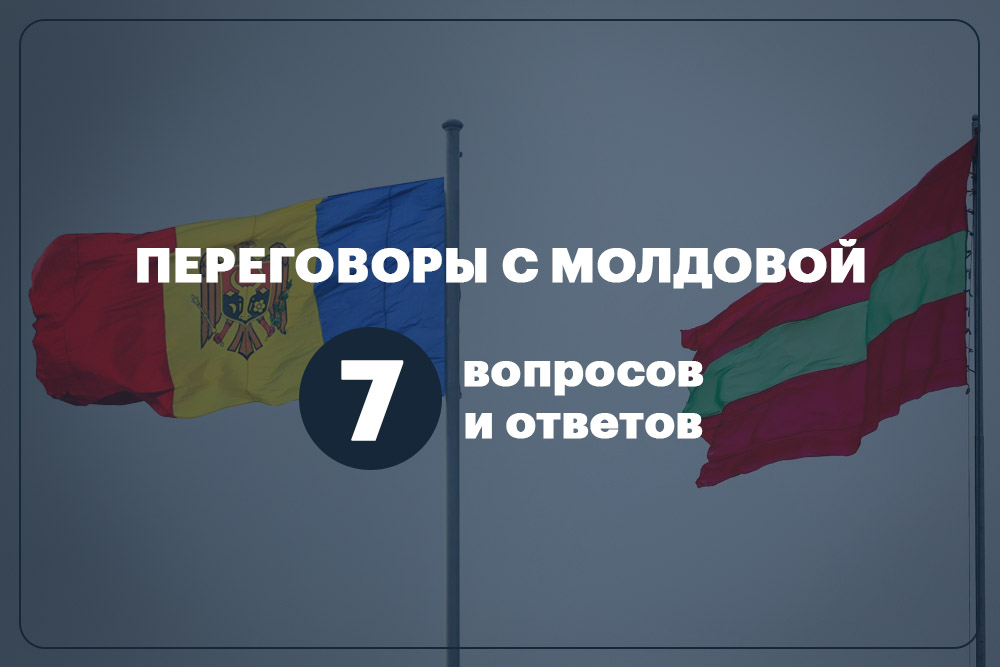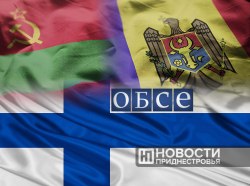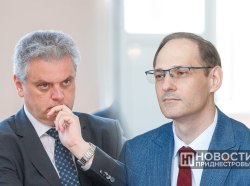On December 1-2, in the Polish city of Lodz, a meeting of the OSCE Foreign Ministers’ Council will take place. Such a meeting traditionally takes place at the end of each year and is headed by the current OSCE chairmanship of a particular country (in such case, Poland). The Foreign Ministers discuss the situation with security and conflict resolution on the European continent, speak of what they managed and failed to do during the year, and adopt the final documents. The Moldovan-Pridnestrovian settlement is always one of the issues on the OSCE Ministerial Council meeting’s agenda.
Today, ahead of the ministerial meeting, Novosti Pridnestrovya news agency will also try to review how the whole year ends for the negotiation process between Tiraspol and Chisinau. So far, we’re only talking about preliminary results. In December, a meeting of political representatives Vitaly Ignatiev and Oleg Serebrian is still expected, where, particularly, the gas and energy crisis as well as new incidents with Pridnestrovian representatives at the Chisinau airport will be discussed. The gas and energy crisis continues developing, and there’re no clear perspectives for its final resolution yet.
In the outgoing year, both experts and participants have repeatedly stated that the negotiations were stagnating. What is the reason for it?
The negotiation process between Tiraspol and Chisinau is conducted at four levels. These include the PMR and the RM leadership’s meetings, the 5+2 format, political representatives’ meetings in the 1+1 format, and, finally, industry expert groups’ meetings. Only the last two levels are working today.
Meanwhile, it was direct contacts between Pridnestrovian and Moldovan leadership that gave the main impetus to the negotiations. We remember this from meetings of the PMR President Vadim Krasnoselsky with the RM’s President Igor Dodon (the JCC working was unblocked particularly after the first of them), including with the then RM’s Prime Minister Pavel Filip.
The 5+2 format, in its turn, has always been an important international technology platform. It was within its framework that the current negotiating agenda was formed. It’s the Berlin Plus protocol, which has been implemented over the past 5-6 years.
Currently, Moldova refuses to resume summit meetings (although this year it was proposed by Pridnestrovie again), as well as the 5 + 2 format working, declaring that such format has become outdated. It turns out that the two “upper” negotiation process levels don’t work. And political representatives as well as industry experts have no authority to resolve such issues. This’s especially felt on the RM’s part. Even if the Moldovan experts offer something, their proposals’ implementation is being actively blocked by the Moldovan government. Thus, for instance, it was the case with the mechanism of importing medicine to Pridnestrovie.
The number of negotiating instruments number has decreased, however, whether the number of difficulties in relations between Tiraspol and Chisinau has increased?
Three new blocks of problems have been added this year. The first of them is blocking the various goods’ import into Pridnestrovie. Additionally, to medicines, we are talking about plant protection products as well as food products. Moldova detained chicken eggs coming from Ukraine, as well as Russian flour and buckwheat supplies. Buckwheat and flour were eventually transported across the border, but there’s no guarantee that a similar situation with food cargo won’t happen again.
As of this writing, there’s no solution either on medicines or agricultural chemistry within the framework of the negotiations. Difficulties with the medicines imported into Pridnestrovie led to a significant rise in the price of certain items in pharmacies.
The second block is the issue of environmental permits for the Moldovan Metallurgical Plant. MMP contended with this in February. Due to the environmental authorizations lack, it was impossible to import raw materials and MMP was forced to suspend production for some time. Until that time, Moldova didn’t require such permits from the plant.
Moldovan inspectorates who carried out inspections three times and made no specific allegations were allowed to enter the MMP. However, the company still doesn’t have the necessary authorizations, and the short-term authorization for November hasn’t been extended either.
Finally, the third block includes the gas and energy crisis in the region. It’s rapidly growing into a separate big issue. Here is the same illegal gas selection by Moldova that was intended for the PMR, prospects for the Pridnestrovian electricity supply to the Republic of Moldova as well as the overall power system’s stable operation. To resolve all these problems, serious negotiating efforts will be needed.
At the same time, the situation with the previous agenda including the decisions’ implementation from the Berlin Plus package is also quite complicated.
The telecommunications agreement has expired. Will it be extended?
The protocol decision on cooperation in the telecommunications and electric communications field is one of the important Berlin Plus package parts for Pridnestrovie. It was signed on November 25, of the year of 2017 for five years with an extension possibility.
Last Friday, this five-year term expired. And this’s sad since Moldova’s decision remained unfulfilled. CJSC Interdnestrcom didn’t receive a Moldovan license with a territorial restriction on Pridnestrovie. The necessary frequency assignments weren’t assigned to it.
Chisinau only amended its legislation, which, in principle, would allow issuing a license with a restriction on the PMR territory. Nothing further has been done beyond this political gesture.
Now, logically, the agreement should be extended to fulfill it. Pridnestrovie has already sent requests to Moldova on such a matter. However, there’s still no adequate answer.
Will there be neutral license plate numbers?
Last December, Moldova delayed workpieces to Pridnestrovian license plate numbers. In May, the Caushensky District Court ruled in favor of the PMR, obliging every workpiece to be returned. However, the Moldovan police representatives filed an appeal and on November 16, the Appeal Court in the Republic of Moldova decided to return the case for additional re-examination to Causeni. The process is delayed again.
Without the workpieces’ import, it will be impossible to issue Pridnestrovian license plate numbers for cars, and without the Pridnestrovian license plate numbers, accordingly, neutral license plate numbers for participation in international road traffic. Vehicle Registration Points in Tiraspol and Rybnitsa have not issued new neutral license plate numbers for almost a year, operating in very limited service.
But even though the issue with workpieces will be solved and the Vehicle Registration Points will work fully again, another problem will arise. On September 1, the agreement on neutral license plate numbers was extended by Moldova, but only for vehicles that were imported into the PMR after September 1, of the year of 2018. Older cars will no longer be able to get such numbers. Thus, Chisinau is continuing to loosen the mechanism for issuing neutral numbers, which was also the Berlin package’s part.
Why is banking cooperation not developing?
Financial and banking cooperation is another problem that has long-standing roots. The Moldovan National Bank here regularly presented the so-called “surprises” to Pridnestrovie. In 1999, 2000, and 2012, at its request, direct correspondent payments of Pridnestrovian commercial banks with Ukraine, the United States, and the European Union, respectively were blocked.
Since the period from 2014 to 2015, there have been difficulties with conversion to hard currencies those Moldovan lei that are received by Pridnestrovian exporting enterprises. Previously, the such problem was solved in different ways, but not now.
At the end of the year of 2019 and the beginning of 2020, there were difficulties with international card servicing on the Pridnestrovian territory (before that, cards could be used to pay even in local stores). And, finally, since 2019, Pridnestrovian enterprises have had difficulties with opening and maintaining accounts in Moldovan banks. Some are forbidden to open them, while others' existing accounts had been terminated. Someone’s accounts seem to be still active, but it’s impossible to conduct any transactions on them. They’re also the RM’s National Bank’s indirect recommendations not to cooperate with firms and even individuals from Pridnestrovie.
Thus, we observe four aspects of the financial and banking problem. Solutions here were once offered by OSCE experts, international consultants from the EU countries, and the Pridnestrovian Republican Bank. But everything rests on the National Bank's position.
Accordingly, this year there wasn’t a single meeting of expert subgroups on banking interaction. There’s no dialogue on such a topic.
Does all this mean that the Berlin Plus package generally suffered a failure?
Not exactly, since there’re still existing agreements. Thus, in Pridnestrovie, the Moldovan Latin-script school work is completely provided. Even the OSCE openly admits that the decision on schools is the best implementation of the whole Berlin package.
The issue has also been resolved with the Moldovan farmers’ access to their farmlands in the Dubossary region of Pridnestrovie. Since the year of 2017, traffic has been reconstructed on the Gura-Bikului-Bychok bridge. Since 2016, agreements on cooperation in the field of hydrometeorology and natural resources protection in the Dniester River Basin have been applied.
Moldova has a mechanism for diplomas’ apostille of the Pridnestrovian State University. For five years, more than 500 people have already received an apostille. It helps either to continue studying or to find a job abroad.
However, there’s something to improve. There’re several countries (for instance, Germany and Ukraine) that don’t recognize the Moldovan Apostille and require the so-called diploma’s super legalization. This’s a simple process that is similar to an apostille, but the Moldovan government refuses to introduce it.
As for the Gura-Bikului-Bychok bridge, Pridnestrovie proposes, with the international intermediaries' help, to continue its repair and make the bridge accessible to trucks.
The Moldovan authorities also don’t comply with the Berlin Protocol point, which concerns the politically motivated criminal cases termination. In the year 2017, about 10 such cases were closed by PMR as a gesture of goodwill, however, such a gesture remained unanswered. Currently, in Tiraspol, they don’t even know against whom from Pridnestrovie the cases had been brought. Such information isn’t provided by Moldova.
The story of the former Pridnestrovian policeman Andrei Samoniy is remaining relevant, the criminal case against him in Moldova caused great doubts from the very beginning. Not so long ago, the Appeal Court in the Republic of Moldova withdrew two of the three charges in this case and reduced the imprisonment term from 15 to 6 years. However, the person is still imprisoned in the Moldovan jail for almost three years.
And what does the Polish Presidency in the OSCE do?
The year is coming to an end, and we can say that Poland hasn’t shown any mediation activity in our direction. Of course, there’s still December, but it’s unlikely that something will change.
It should be noted that the Polish presidency hasn’t appointed its special representative for the Moldovan-Pridnestrovian settlement. The Thomas Mayr-Harting authority was extended.
Poland lost any possibility of operational impact on the situation by not delegating its special representative. Although, perhaps, there was no aim to influence something.
Additionally, before the OSCE Ministerial Council meeting, a scandal was provoked by Warsaw denying a visa for Russian Foreign Minister Sergei Lavrov.
In the year 2023, the OSCE Chairmanship will be handed over to North Macedonia. Time will determine what will be demonstrated by them in our region.








